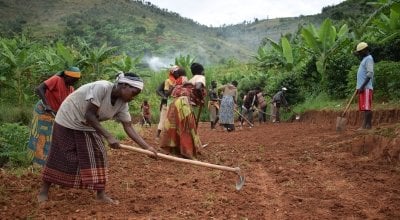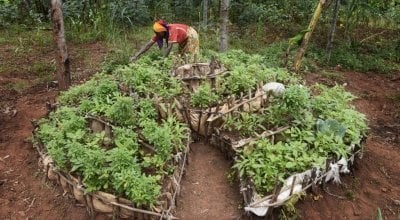
Knowledge Hub
Why life is so hard in Burundi

Why is Burundi one of the poorest countries in the world?
When instability and climate change blight a country already struggling with high levels of poverty, the consequences can be catastrophic. Burundi, a country in East Africa, reveals the dire consequences of such problems like no other. Instability, poverty and an uncertain climate has made it one of the world’s most fragile countries.
Here we explain more about the country and how you can help.
Burundi’s growing needs and shrinking resources
Burundi is a small landlocked country bordered by Tanzania, Rwanda and Democratic Republic of Congo. It has a hilly landscape, prone to erosion and landslides, making food production for a growing population problematic.
It has one of the highest rates of malnutrition in the world with nearly two thirds of all children (56%) under five years old reported as malnourished. The latest data available in the Global Hunger Index (GHI) shows that levels of hunger are high and worsening each year.
Even during the harvest season when food is most abundant, families spend up to two thirds of their income on food. During the lean season when prices rise those living in poverty find it even more difficult to access adequate nutritious food.
Joseph Nkengurukiyimana

Project Supervisor Joseph Nkengurukiyimana works on Concern’s Graduation programme in Mabayi, Cibitoke, Burundi. He describes what life is like for someone living in extreme poverty in Burundi, “There are many extremely poor households in Burundi. Our programme targets households with limited access to health services and education, and with little or no access to land. People in these circumstances aren’t able to produce enough food to consume, so they have to depend on casual work on a daily basis.”
Concern’s innovative programme, the Graduation Programme known as ‘Terintambwe’ or ‘Take a Step Forward’, is a proven model of moving households out of extreme poverty in a way that is effective and lasting. Over a period of three years, the programme guides families through an integrated package of support to help them build a sustainable livelihood. This package is tailored to each individual’s skills, the needs of the community and the geographical challenges of each location. The programme includes consultation with communities and individuals to identify their needs, and delivers training in business or vocational skills, financial and savings support and start-up business grants.
Unstable environments
Burundi is heavily reliant on agriculture and 90% of the population are working in this sector. Climate change presents a problem in a country already limited by the amount of land available for farming. The growing number of natural disasters in the country has impacted an already vulnerable farming community. Small, rural farmers are often overwhelmingly affected by poverty and the impact of floods, droughts and torrential rain hits them the hardest.

Two-year-old Delphine lives with her mother in Kirundo, the province with the highest rate of childhood malnutrition in Burundi. Delphine was found to be malnourished at just six-months old because she wasn’t able to get the nutritious food she needed. Her mother, Espérence, attended a series of nutrition sessions run by Concern where she learned good nutrition, food preparation and hygiene practices.
She said, “I attended two sessions with about 24 other mothers. Each session lasted for twelve days. During that time we were paired with a Maman Lumière (light mother). She showed us how to cook and I was able to share her cooking utensils. Delphine hasn’t suffered from malnutrition since then. Delphine might have died because she wasn’t getting the right food to keep her healthy. Now I know what’s best for her and I’m happy because of the advice and knowledge we have been given.”
Concern also encouraged Espérence and her husband to build a kitchen garden and grow their own food such as aubergines, sweet potatoes and amaranth. She explains how vital this is:
We earn a living from tending our own plot of land and kitchen garden, but there are times we have to look for casual work. During the lean periods we eat only once a day.
Who is most affected?
The crisis disproportionately affects children, who make up around half of the population. The situation in Kirundo province is particularly alarming with rates of acute malnutrition among children rapidly on the increase. Severe acute malnutrition is the most extreme and visible form of undernutrition. Its face is a child – frail and very thin – who requires urgent treatment to survive.
The government is currently unable to support the needs of its poor population. Insecurity and a failing economy have placed additional strains on already weak government services and the instability restricts trade both inside the country and across its borders, limiting the availability of food.
What is Concern doing to help people in Burundi?
Concern works with communities to manage acute malnutrition and supports almost 550 Community Health Workers and more than 5,400 volunteers who carry out regular childhood screening programmes. The health workers are trained to spot the early signs of malnutrition and treat coughs, malaria and diarrhoea. Mamans Lumieres, light mothers, are female volunteers and mothers themselves. They explain the benefits of breastfeeding, train mothers to ensure their family get a nutritious diet and show them how to prepare food hygienically and for optimal nutrition.
Mothers whose children are moderately acutely malnourished are enrolled in nutrition sessions where they receive advice on how to ensure their child is getting the diet it needs. They are also given support to build a kitchen garden and an opportunity to be part of a savings and loans scheme.
The approach is especially effective because it focuses on behaviour change and peer-to-peer communication aimed at stopping malnutrition and easily preventable diseases before they take hold. When cases of severe acute malnutrition are diagnosed, the mother and child are referred to a local health centre where they receive treatment. However, the limited number of clinics offering these services, and the lack of facilities for complicated cases (there are only two in the whole of Kirundo) mean that there are insufficient structures for severe acute malnutrition treatment.
The future
The aim of Concern’s work is to ensure that these communities have a bright and hopeful future. Providing nutrition advice and assistance in times of dire need is just part of the answer.
Our kitchen garden project is a sustainable way for families to feed themselves and provides a community-based solution that makes a real difference in countries like Burundi. The gardens themselves are very simple: Concern provides seeds and training for families to grow a vegetable patch designed to maximise the production of food throughout the year. Families can grow carrots, avocado, sweet potatoes and plants like the protein-rich amaranth.

Husband and wife Victoria and Bosco earn a living from what they grow on their plot of land and kitchen garden, with Concern’s help. They have five healthy children, all of them boys, ranging from age three to 18.
Eating vegetables is a benefit to our family’s health. The good thing about the kitchen garden is that vegetables are available all year round. Even in the summer, when we lack rain, they continue to grow when they are watered. We can eat them any time we like.






